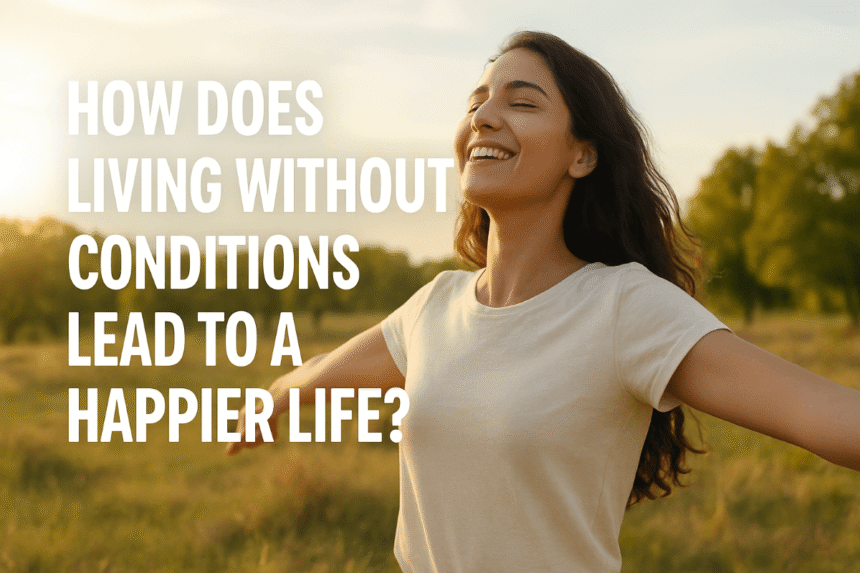Living without conditions is one of the most powerful ways to experience true happiness, freedom, and inner peace. Our happiness largely depends on how we feel from within, not on external circumstances. The more we impose conditions on life—expectations, demands, and rigid standards—the more we restrict ourselves from feeling genuinely happy.
When we place conditions like “I’ll be happy if…” or “I’ll feel good only when…”, we tie our joy to outcomes we cannot fully control. But when we learn to let go of expectations and embrace unconditional living, we discover a deeper sense of contentment and fulfilment.
Importance of Living Without Conditions
The importance of living without conditions lies in the freedom it gives us from constant disappointment and frustration. By dropping unrealistic expectations, we shift from chasing happiness to experiencing it in the present.
- Example: If your happiness depends on whether people appreciate you, your mood will fluctuate with their reactions. But when you learn to stay happy regardless of others’ behaviour, you gain emotional independence.
- Why It Matters: Life is unpredictable. The fewer conditions you impose, the more adaptable and positive you become, even in uncertain times.
Benefits of Living Without Conditions
Living unconditionally brings a wide range of benefits that transform the way we think, act, and connect with others.

- Greater Inner Peace
You stop battling with “what should be” and start accepting “what is.” This mindset reduces stress and brings calmness to daily life. - Improved Relationships
When you love, support, and give without conditions, your relationships naturally deepen. People feel safe and valued when expectations don’t judge them. - Enhanced Resilience
Life’s ups and downs no longer dictate your emotional state. You become more resilient and capable of handling challenges with strength. - True Freedom
Conditions often act like invisible chains. Letting them go allows you to live authentically and pursue passions without fear of judgment. - Sustainable Happiness
Unlike temporary joy tied to achievements or approval, unconditional living fosters lasting happiness that endures beyond circumstances.
- Example: A person who only feels happy when receiving compliments at work will suffer when feedback is neutral or critical. However, someone who finds joy in doing meaningful work, regardless of recognition, tends to enjoy consistent happiness.
How Living Without Conditions Leads to True Happiness?
1. Breaking Free from the Cycle of Expectations
Expectations often keep us trapped in disappointment. When we help a friend, we expect them to return the favour. When they don’t, we feel let down.
Living without conditions means giving, loving, and supporting without attaching your joy to someone else’s actions.
- Example: If you gift someone a book and expect a return gift, your joy depends on them. But if you give out of love, you’ll remain happy regardless of their reaction.
- Tip: Before doing something, ask yourself, “Would I still do this if I got nothing in return?” If yes, you’re living unconditionally.
2. Experiencing Joy in the Present Moment
Conditional living often ties happiness to future events. “I’ll be happy when I buy a house” or “I’ll relax after retirement.” This mindset postpones joy.
By embracing unconditional living, you find meaning in small, everyday experiences.
- Example: A child can laugh with a simple toy, while adults often wait for bigger achievements to feel happy.
- Tip: Practice mindfulness—when eating, savour the taste; when walking, notice the breeze. Bring happiness into the present instead of waiting for the future.
3. Strengthening Relationships Through Unconditional Love
Relationships suffer when filled with unspoken conditions. We expect our partner to meet our needs, our friends to always support us, or our family to act a certain way.
Unconditional love builds deeper and healthier bonds.
- Example: Parents love their children despite mistakes, creating security and acceptance. Conditional love, on the other hand, weakens trust.
- Tip: Instead of saying, “I’ll only be happy if my partner changes,” shift to appreciating their strengths while supporting growth.
Unconditional Love: A Parent’s Priceless Gift
4. Building Inner Peace by Letting Go of Control
Conditional living ties happiness to controlling outcomes—career success, relationships, or daily routines. But life rarely follows our plans.
Letting go of control and embracing uncertainty creates inner peace.
- Example: A student may study hard but not get the desired marks. If their happiness depends only on grades, disappointment follows. If they value learning itself, peace remains.
- Tip: Focus on effort, not outcome. Ask, “Did I give my best today?” rather than, “Did things go my way?”
Maintaining Inner Peace During Criticism, Conflict, and Rejection
5. Discovering Freedom and Fulfilment
Conditions often act like chains of “shoulds” and “musts.” True freedom comes when you release them and live authentically.
- Example: Someone who avoids painting because “it won’t earn money” is living conditionally. When they paint for joy, they feel true fulfilment.
- Tip: Identify areas where conditions hold you back—career, hobbies, or relationships. Remove unnecessary “rules” and allow yourself to live freely.
Conclusion
Living without conditions doesn’t mean living without values—it means freeing yourself from tying happiness to external circumstances. The more you demand life to follow your rules, the more joy slips away. But when you open your heart, give without expecting, and embrace the present moment, happiness naturally flows.
So, are you ready to let go of conditions and discover the freedom of true happiness?
FAQs – Living Without Conditions
1. What does it mean to live without conditions?
It means doing things without expecting results in return and detaching happiness from external factors.
2. Why is living without conditions important?
It reduces stress, prevents disappointment, and helps you adapt positively to life’s uncertainties.
3. What are the benefits of living without conditions?
Inner peace, better relationships, emotional resilience, freedom, and lasting happiness.
4. Does unconditional living mean not having goals?
No. Goals matter, but unconditional living means enjoying the journey, not just the destination.
5. How can I practice unconditional living in daily life?
Start small—help without expecting thanks, love without demanding returns, and find joy in the present.
Thank you for taking the time to explore this post. I hope you found it both insightful and enjoyable.
Remember, your sharing can make a positive impact! Please share this post across your social media and other networks, allowing others to gain from its content.
PVM

Mathukutty P. V. is the founder of Simply Life Tips, a blogger, content writer, influencer, and YouTuber passionate about learning and sharing. Guided by “Simple Living, Creative Thinking,” he believes in the power of knowledge sharing and lifelong learning.
Related
Discover more from Simply Life Tips
Subscribe to get the latest posts sent to your email.







